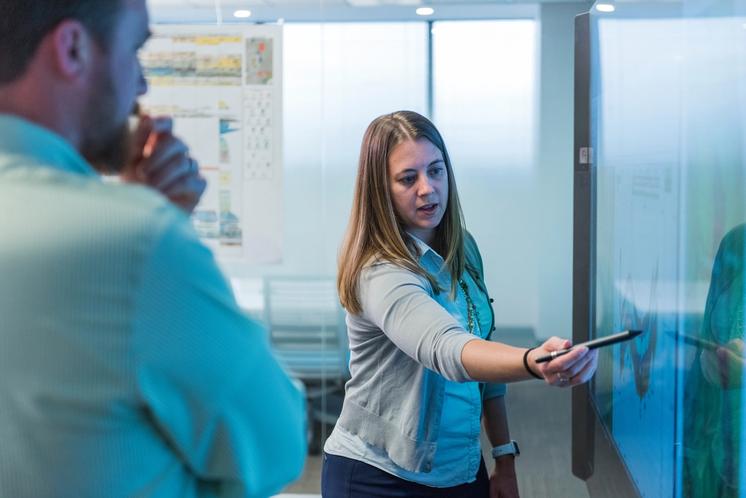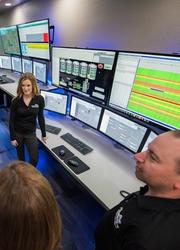
The Age of Disruption
As we enter the 2020s, we find ourselves in the midst of an age of disruption.
We’ve seen long-standing industries and business models completely remade through the power of digital solutions. No business has been without change. Many companies that were titans in their respective industries have been made obsolete – or lost significant market share.
It’d be foolish to think those same forces won’t also affect more traditional industries.
That was the assessment of CIO Bruce McCullough in a cover article that appeared in the February 2020 issue of CIO Review.
This article by Marathon Oil’s CIO Bruce McCullough was printed in CIO Review in February 2020, and reprinted below with their permission.
Please note our forward-looking statements disclaimer.

Team members review a digital schematic at our Houston headquarters.
In the oil and gas sector over the past decade, advances in horizontal drilling and hydraulic fracturing have converted what was once an uneconomic resource – shale oil – into something that’s profitable. It’s had a dramatic impact not only on the U.S. energy landscape but also global oil markets.
Many may not realize that this industry is poised for even more disruption from digital technology in the new decade.
It stems from an unbelievable amount of data that we’re generating. While we’ve never been data poor in our business, the shale oil plays have taken it to an entirely different level.
We operate thousands of wells, and they’re constantly streaming data. Seismic, control systems and drone technology pump out data. The trick is how we convert that volume of data into useful information. How do we digest it all? How do we interpret it? And most importantly, how do we make better decisions?
It requires a different set of tools and skills than what we have today. And it’s only going to change and accelerate over time.
The good news is that companies, like Marathon Oil, are already forging a path for how we’re going to apply a new set of technologies to what is only about a 10-year-old business of shale oil. Similarly, we can match an individual’s expertise to the task at hand, and then measure the efficiency and identify areas for improvement.

Bruce McCullough — Sr. VP of Technology & Innovation and CIO
One example is something we call FSM, our field service manager. We didn’t invent the core technology. We found it outside our industry, and integrated it into our own proprietary workflows. It’s a dynamic scheduling technique. Instead of having our oil field operators drive to each well site every day, FSM tells them where to go for the highest value intervention. The system finds the nearest driver, and sends them directions to the locations in their vicinity that need their specific skills or equipment. Sound familiar? Think Uber, Amazon, FedEx.
Another example is how we’re using gaming technology to simulate the subsurface. What used to take companies weeks to model 3D subsurface data, has now been reduced down to minutes – sometimes even faster – with the application of gaming tech. Processing power and speed that enables massive multiplayer online games, like Fortnite, is being applied to our industry so we can process and use geological and petrophysical data in real time. It’s a literal game changer!
The ultimate vision is creating a digital model of the entire enterprise, all the way from the subsurface to the sales point, that we can use to simulate our business and ultimately enhance our ability to make decisions. Of course we still need physics and engineering. But as a complementary parallel, we can design a digital entity that allows us to simulate an infinite number of scenarios and outcomes very quickly.
No matter the industry, companies that can take these two worlds and seamlessly integrate traditional business with digital advancements – these are the companies that will be successful in the future.
Today at Marathon Oil, yes we’re an oil and gas company, but we’re also a tech company.
We never bet against technology and smart people chasing innovation. And never underestimate the power of technology to reshape entire industries.























